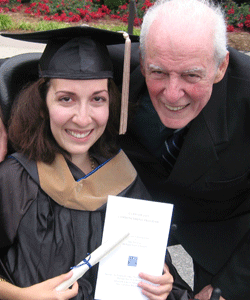I kept the secret of my father’s criminal conviction, and later incarceration, for the falsification of patient records and the distribution of controlled substances for five years. I never intended to keep this information from people; I didn’t say anything because I always held hope that my family’s situation would improve. Instead it got progressively worse.
It all began when I received a call one September night at the start of my second year at Fuqua. My sister told me that my parents’ home and my father’s medical office had been raided by the FBI. Following that news, days, weeks, and months passed in a dreamlike sequence. I often had to remind myself in the mornings, after calls with lawyers and between classes, that this was happening, and indeed, that this was my new reality. I experienced dramatic emotional swings. One moment I was crying on the phone with family, while the next I was forcing a smile for acquaintances, mustering my best acting skills to pretend all was well in my life.
When classmates asked me how I was or shared their anxiety over job searches, I held my tongue and thought in growing resentment, You think this is a problem? Try finding an effective lawyer and the money to pay him so your 76-year-old father doesn’t end up in jail.
It was all so foreign to me and my family. None of us had experienced navigating the criminal justice system. The harshness of the accusations, the threat of an indictment despite our certainty that my father was innocent, and the looming possibility of a trial were horrifying and shame-inducing. And the rate by which the complexity of the situation grew was dizzying.
By the time I graduated from Fuqua, before I started work with a bank in my native Philadelphia, my father was waiting for a trial date. By early 2012, he had lost his case; unable to prove a conspiracy between the office manager and a former patient, he was found guilty of all charges. At the age of 79, ill with prostate cancer, congestive heart failure, and a rare blood disorder, my father was sentenced to seven years in prison. At his age and in his condition, it was a death sentence, but the judge referred to it as a “significant break.” I immediately thought, Today I’ve seen evil in its ignorance and cruelty firsthand.
The news of my father’s fate threw me into a deep depression. Only my closest friends knew of the situation, and I became more isolated at work. As his prison start date loomed, I cared less and less about my appearance. Project deadlines, employee issues, and other conventional matters of everyday office life seemed inconsequential—because they were. My father, the man who had shown and given me so much love in my lifetime, was facing a life and death situation, and no one seemed to care because I had told so few. I had created my own prison of silence to protect myself and give in to the shame I felt. But faced with one of my greatest fears—losing my dad—I felt compelled to act.
I wrote letters to every U.S. senator. I contacted specialists, activists, and more criminal attorneys than I could count. When these efforts began taking up more and more of my time, I resigned from my job and told my closest colleagues the reason I was leaving. When I started an online petition on Change.org asking President Obama and former Pardon Attorney Deborah Leff to free my father, I finally made the leap through the bars of the prison I created. Once my secret was revealed online, I knew there was no turning back. The fear of exposure and judgment was replaced with a surge of hope as the signatures of support grew exponentially.
I wish I could write that my efforts paid off and that my family and I were able to prove my father’s innocence. And most of all, I wish I could write that my father came back to us and died surrounded by his family. But he didn’t. On the night of June 28, 2015, and at the height of the Change.org petition, he died in prison 300 miles away.
Before this experience I was distrustful of others and felt my tendency to withhold information was justified. I was quick to judge others—and harshly. I believed capital punishment was sometimes warranted; now I don’t. I see the sanctity of all human life that I didn’t see before. I have more compassion and a greater capacity for understanding other perspectives. I gained this gift because when I witnessed the judge and the prosecuting attorney effectively sentencing my dad to life in prison, I knew, as painful as it is to admit, that they were simply doing their jobs.
There are still days when I find it challenging to move forward because the sadness I feel for my father holds me back. But I know what he would say: “Life doesn’t always go down, down, down. It has to go back up! No use in crying.”
What my father endured in the last years of his life doesn’t define him. He was a great man. He cared deeply about the well-being of his patients, devoted his career as a physician to helping an underserved neighborhood in South Philadelphia, and loved his family profoundly.
And that’s something I will never keep a secret.
Dwyer M.B.A. ’11, is a human resources professional and a budding writer. She explores everything from career development to life after death on her website, www.violaminicozzi.com.

Share your comments
Have an account?
Sign in to commentNo Account?
Email the editor